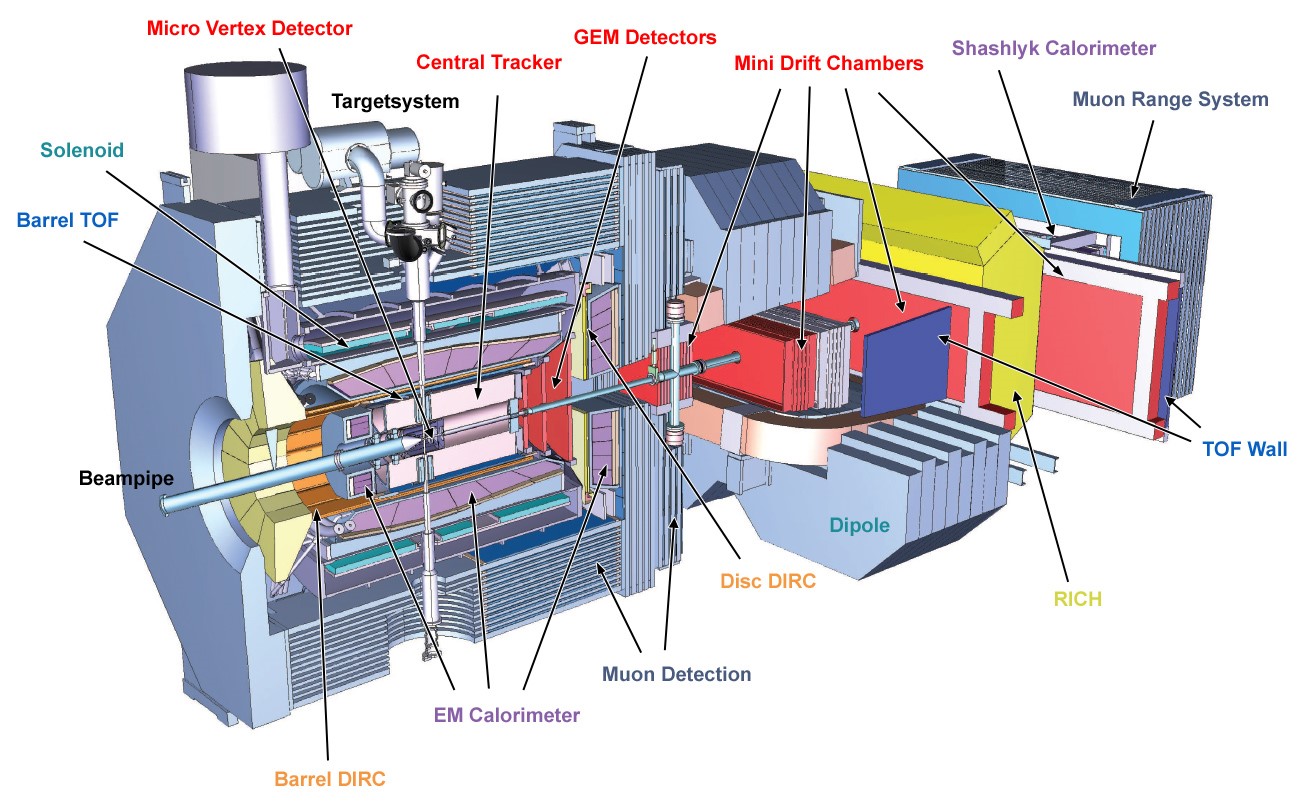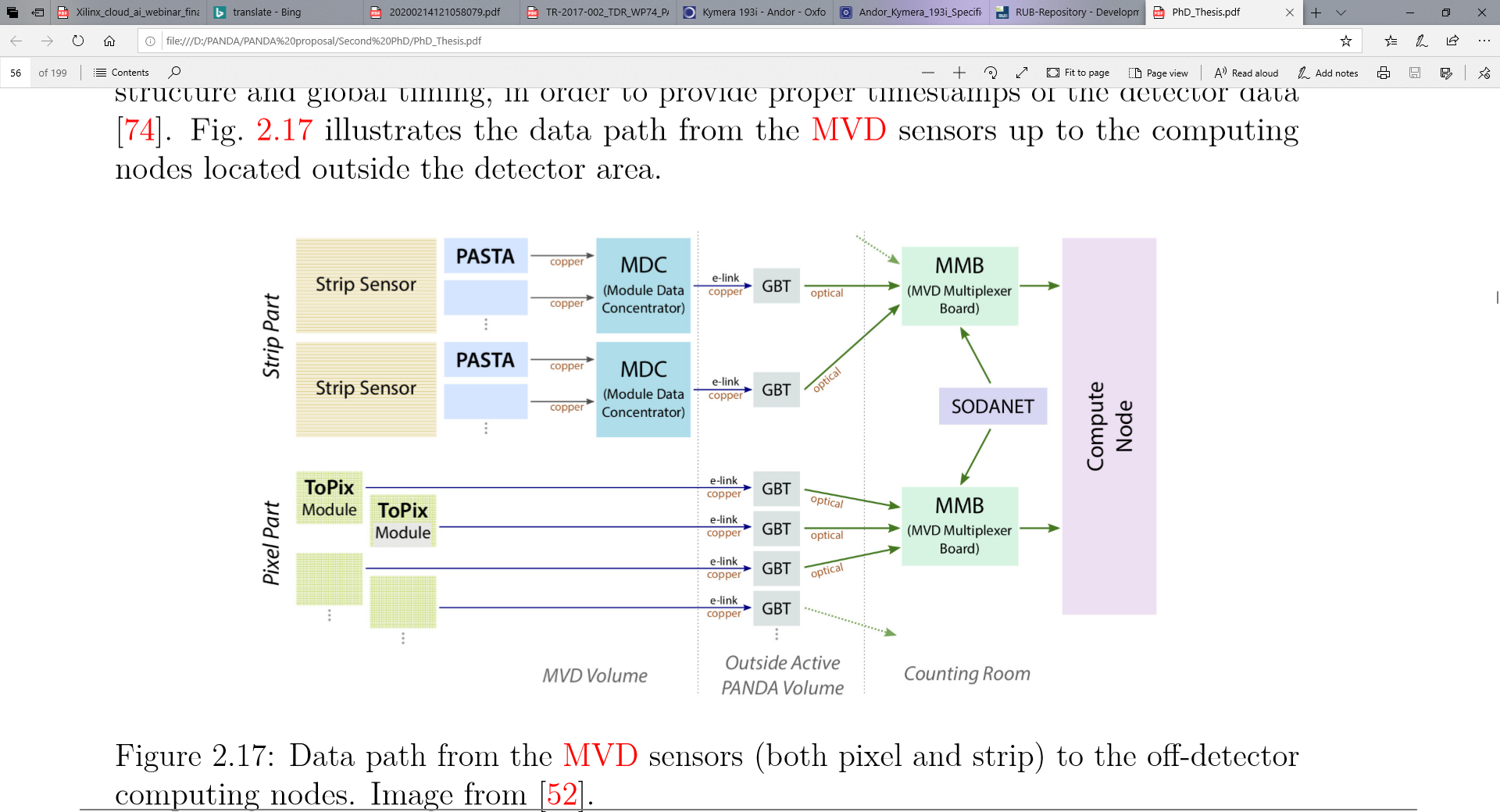Development of a high-speed DAQ system for the Micro Vertex Detector of PANDA
- job offer:
-
job categories:
PhD thesis
-
job posting number:
28-2020-IPE
-
faculty / division:
ETIT
-
institute:
IPE
-
starting date:
On appointment
- contact person:
Collider experiments require extremly challenging detectors and data acquisition electronics. The PANDA experiment, currently under construction at GSI in Darmstadt, will be one of the key experiments at the Facility for Antiproton and Ion Research (FAIR). The PANDA collaboration with more than 400 scientists from 18 countries intends to do elementary physics research on various topics like weak and strong forces, exotic states of matter and the structure of hadrons [1].
|
PANDA detector |
The PANDA detector is composed of several subdetectors. The subdetector closest to the interaction point, for precise reconstruction of primary and secondary vertices of the interaction, is the Micro Vertex Detector (MVD). It is equipped with silicon pixel and strip sensors and custom front-end electronics to readout the data.
This PhD thesis will focus on design and development of the data acquisition system (DAQ) for the MVD detector. It needs to readout data continuously, since no first-level hardware trigger will be available, and it needs to be flexible to cope with anisotropic occupancy and different target types. The data acquisition architecture of MVD is shown below.
Data path from both MVD sensors types (pixel and strip, left) to the computing nodes (right).
The data coming from several MVD front-ends, transported via the optical GBTX links, are multiplexed into a single outgoing link and sent to the computing node. The task will be performed by the MVD Multiplexer Boards (MMBs) hosting a Field Programmable Gate Array (FPGA) [2]. Within this PhD project the following tasks are required:
i) development of the MMB readout card based on the latest generation of FPGAs, which should be employed as a stand-alone card for the test and characterization of the MVD module.
ii) development of the FPGA firmware
iii) integration of the MMB within the data acquisition framework of the PANDA experiment.
There are many aspects of this project, which will require in-depth R&D. This includes advanced design and production of complex, high-performance printed-circuit boards with massive optical communications, and integration with the SODANET. The PhD project will be conducted embedded in the DAQ system design group at the Institute of Data Processing and Electronics (IPE) at KIT and will mainly be located in Karlsruhe with regular trips to GSI. The research plan includes the design of electronics, test & validation, commissioning at the PANDA detector and scientific publication are part of the PhD process. Throughout the project the results will be presented to the PANDA collaboration partners. Supervision of bachelor and master students, presentations at scientific conferences, and writing high-impact journal articles is expected.
Anticipated duration: 3 years
Qualifications
A master degree in Electrical Engineering, physics or equivalent is required. Experience in FPGA design is a definite advantage, as well as being comfortable in specifying system components and sound experimental problem-solving skills. You are a naturally curious person who is eager to learn fast and has a strong interest in research. Good English language proficiency is essential, basic German language skills are of advantage.
KIT
KIT is one of the largest research institutions worldwide and has been created by a merger of the National Research Centre of the Helmholtz Association and the former Technical University of Karlsruhe. This project is hosted at the Institute of Data Processing and Electronics (IPE). The institute is specialized in the development of custom detector, trigger and data acquisition systems for high data rates and in control and monitor systems.
Contact
Dr.-Ing. Michele Caselle <michele caselle ∂does-not-exist.kit edu>
Tel: +49 721-608-25903
Applications
Please send applications with CV, publication list and your contribution to the publication (if relevant), academic transcripts, degree certificates, contact details for three references and a preliminary research proposal.
References
[2] V. Di Pietro R. Schnell, K.-Th. Brinkmann et al. The Readout Chain for the PANDA MVD Strip Detector. Journal of Instrumentation, 10(02):C02003, 2015. URL http://stacks.iop.org/1748-0221/10/i=02/a=C02003.



